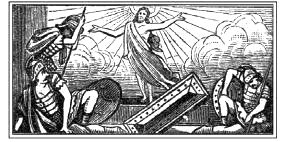
| Contents | Christe, Redemptor omnium O Christ, be Reconciled to Thy Servants |
OmnesSancti |

This hymn is attributed to Rabanus Maurus (776-856). In the Roman Breviary it appears as the hymn Placare, Christe, servulis. In the interest of conforming to classical models, Pope Urban VIII revised Maurus' hymn leaving only line 22 unaltered. Thus given the extent of the changes, that hymn ought to be considered as a hymn distinct from this one. Christe, Redemptor omnium is used for first and second Vespers for the Feast of All Saints (Nov. 1).
|
| CHRISTE, redemptor omnium, conserva tuos famulos, beatae semper Virginis placatus sanctis precibus. |
TO Thy poor servants reconciled show mercy, Christ, for whom the mild and Virgin Patroness this grace implore before Thy Father's face. |
| Beata quoque agmina caelestium spirituum, praeterita, praesentia, futura mala pellite. |
Ye glorious hosts, whose circle nine before God's throne refulgent shine, shield us with your celestial arms from past, present, and future harms. |
| Vates aeterni iudicis apostolique Domini, suppliciter exposcimus salvari vestris precibus. |
Apostles with the Prophets plead for weeping sinners in their need, that from their Judge severe they gain pardon, effacing guilt's dark stain. |
| Martyres Dei incliti confessoresque lucidi, vestris orationibus nos ferte in caelestibus. |
Ye purpled martyrs, you, now dressed in white because your lives confessed your Lord on earth, us exiles call unto the fatherland of all. |
| Chori sanctarum virginum monachorumque omnium, simul cum sanctis omnibus consortes Christi facite. |
O choir of virgins, stainless band! and ye for whom the desert-land made sure the way to heavenly rest, prepare us mansions with the blest. |
| Auferte gentem perfidam credentium de finibus, ut unus omnes unicum ovile nos Pater regat. |
The race perfidious expel from regions where the faithful dwell; let one sole shepherd be our guide, all Christians in one fold abide. |
| Sit Trinitati gloria, vestrasque voces iungite ut illi laudes debitas persolvamus alacriter. Amen. |
Glory, O Father! to Thy name; eternal Son, to Thine the same; to Holy Paraclete be praise throughout the everlasting days. |
| Latin from Liturgia Horarum, English from "Catholic World", Vol XXXII, 1880 |
<- Prev |
Next-> |
